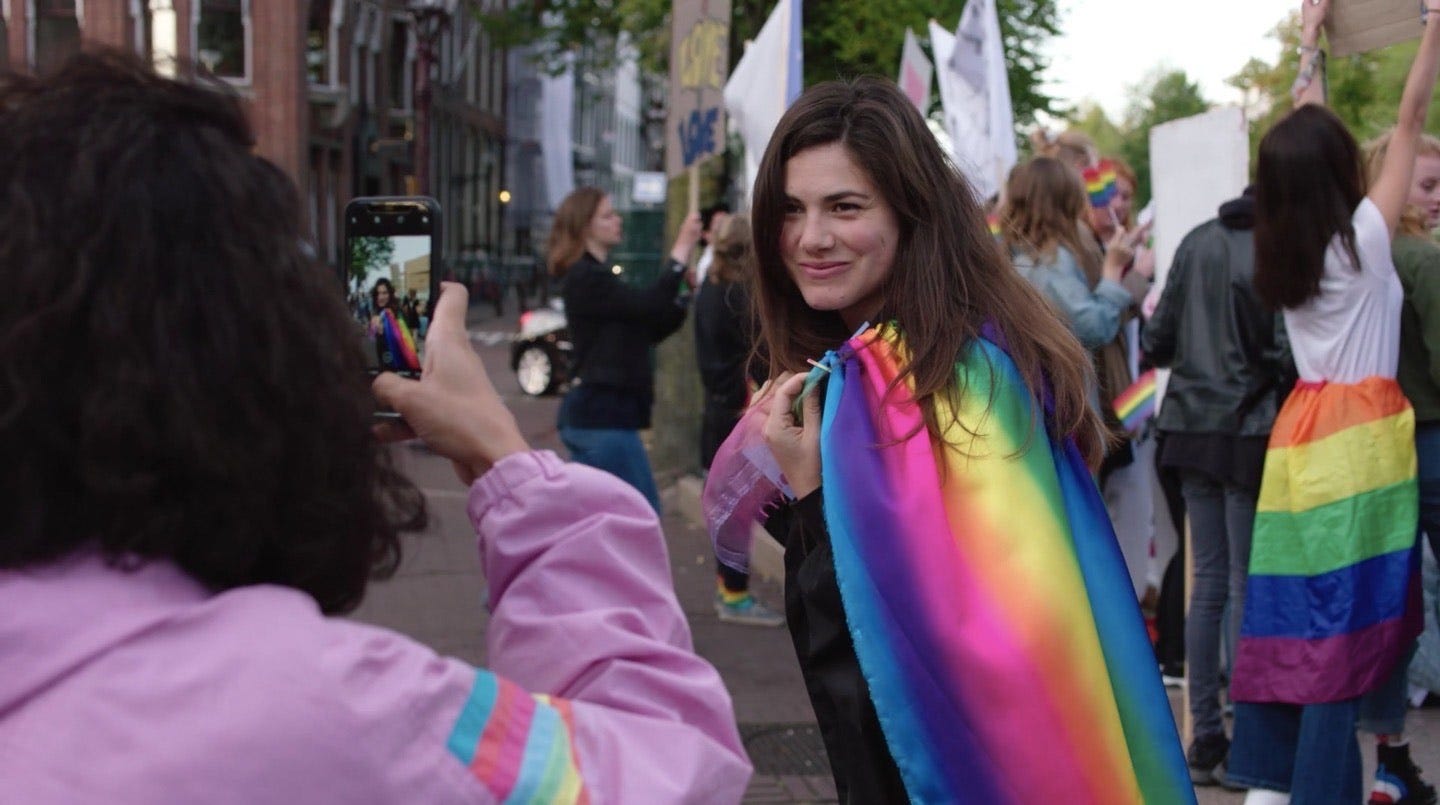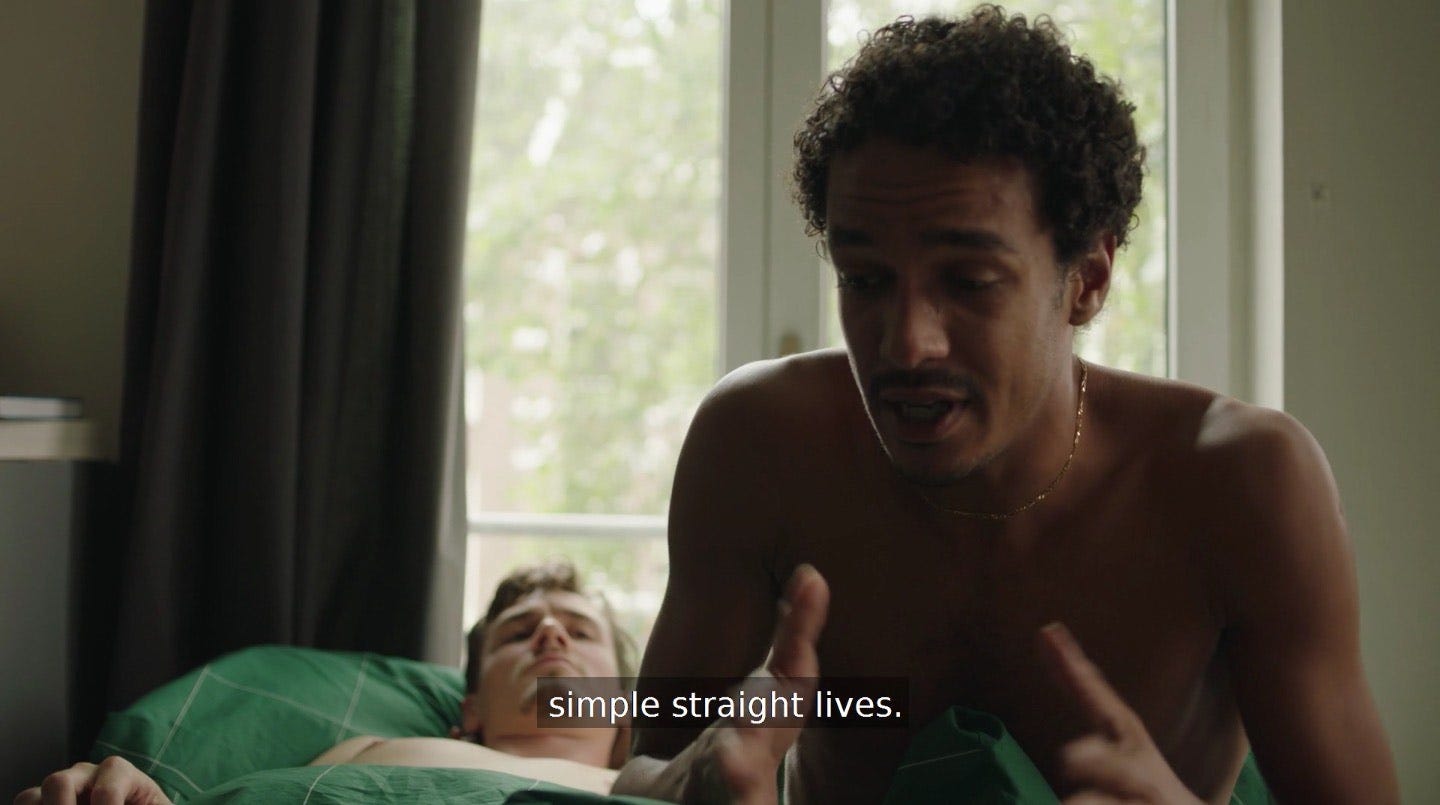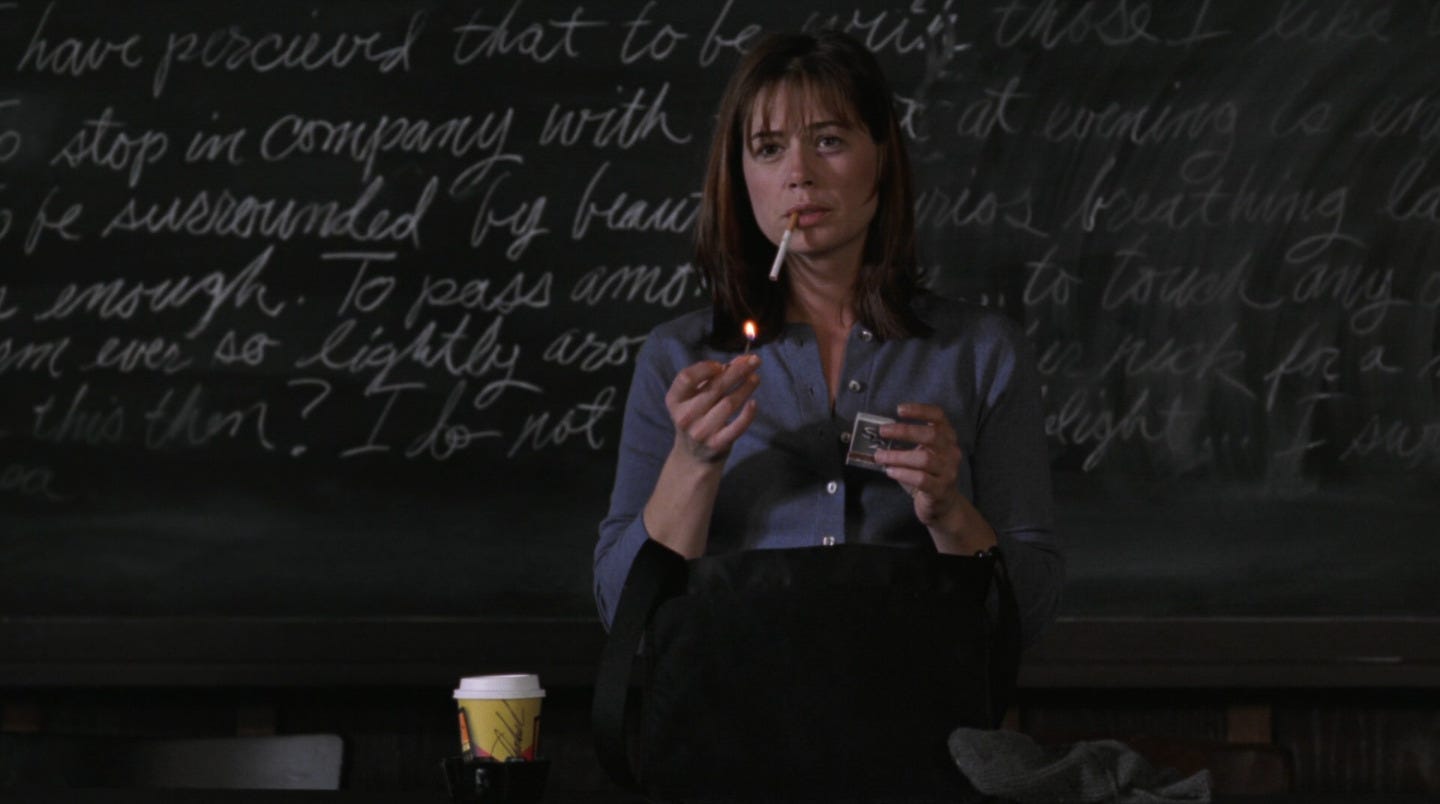The Queer Joy of Anne+
A conversation with Anne+ creator Maud Wiemeijer.
I've been going on a lot of dates lately. It might have to do with feeling the scarcity of things: of my health as Covid immunity wanes, or of time flying by too quickly. I think this gravitational pull toward being intentional about dating, after a few years of happy self-sufficiency, might be an attempt to find comfort, in a Maslow’s Hierarchy of Needs kind of way. But I’ll ask my therapist and get back to you.
As I try to carve out space in my life to be open to that possibility, Anne+ is feeling all the more relatable—a series unearthing queer joy on an episodic basis as we follow Anne through her dating and career tribulations. The Anne+ series streams on Topic in the US, and on CBC Gem in Canada; a feature film is now available to watch on Netflix internationally.
Cultivating joy as a queer person is inherently transgressive. There is still so much about this world that wants to snuff us out, keep us quiet and out of sight, pretend we don’t exist. We’re so used to stories about our death and our abuse, our loneliness and our closeted lives. We're constantly disappointed by how our stories are concluded. We're baited to believe these shows care about their queer audiences, only for satisfaction to be withdrawn at the last second.
I still too clearly remember the nausea of early 2018, when The Assassination of Gianni Versace: American Crime Story aired concurrently with the (literal) unearthing of Toronto serial killer Bruce McArthur's victims. Every week I would tune in to watch Darren Criss beating a gay man to death. That same day, I would read the news about dismembered bodies being found hidden in planters on McArthur's previous landscape jobs.
It was a heady time, and I lived only a few blocks away from the gay village in Toronto where McArthur's victims were sourced. Of course, there was no acknowledgment of these parallel stories as they happened. Criss and Ryan Murphy’s American Crime Story team picked up multiple Emmys for the show. I personally couldn't even finish the series, my stomach in knots over the struggle to find queer stories that aren't related to death.
A few years later, and it sometimes feels like two steps forward, one step back. It feels like shows that focus on queer adults end before they really begin (Special, Work in Progress), while some shows about queer teens are increasingly pornographic (Gossip Girl, Euphoria). Watching Anne+ for the first time was a revelation, and scratched that itch for stories I'm always looking for: a 20-something queer millennial, desperately seeking to feel seen in her partnerships and creative endeavours, figuring it out one day at a time. I think there’s also a case to be made for how series about lesbian characters have paved the way for other queer stories to be explored.
I recently had the pleasure of chatting with Maud Wiemeijer, the writer and creator of Anne+ (co-created with series director Valerie Bisscheroux and star Hanna van Vliet). A feature film continuation of the series was recently released internationally on Netflix, and follows Anne as she is asked by her girlfriend to move to Montreal while she’s trying to figure out (once again) what she really wants out of her life and relationships. Surrounded by boxes in her new home in Amsterdam, Maud Zoomed with me to discuss the original series, the state of queer television, and our mutual love for Maura Tierney, among other things.
TV Scholar: Congratulations on the Anne+ film, out now internationally on Netflix! It’s such a huge deal. I was wondering why you decided to pivot from a show to a movie, what were the factors and decisions around that?
Maud: We were pitching for a season three actually. We pitched a movie and a season three, and the movie got picked up. That’s kind of how it went. We preferred the movie because it gave us the opportunity to go deeper into Anne’s story and develop her character more.
In the series, there were so many storylines between her friends—which was very fun but it was nice to deep-dive into Anne’s mind and conflict, and also to develop ourselves as makers. A feature film is different in writing, director and acting than a series. It gave us more room for longer scenes and dialogue, without all the snappy stuff you have to do for television. It worked out great for us.
The first season of Anne+ was crowdfunded and it had more of an indie feel to it. I’m assuming you had more budget and resources to work with on the film. What were some of the challenges and differences making the series versus the film?
Of course, the budget is nice. When you work for a streaming service, the process is quicker, so we had to work hard to make it happen. It was good for us, to help us focus on what kind of story we wanted to tell. It was also hard for us—the seasons were so much around Anne’s friends and her social group.
At first we wanted to do that in the film as well, but we realized for a movie we have to go back to Anne’s storyline. It was a learning process for us. We love her friend group so much—the movie is very much still about friendships, but focuses more on Anne. It was good to go back to the core of Anne+.
There’s something so authentic and grounded about the Anne+ universe. How much of that is your own experience?
Almost everything is based off of conversations we’ve had with each other or experiences we’ve had. It’s not literally out of our lives, but very much inspired by the conversations we have. Some of the dialogue in the movie, we literally have these conversations amongst ourselves.
I would say a lot of it feels authentic because it is. It’s all written in the way that we talk to each other. As a writer, I like to write realistic dialogue.
Would you ever branch the film back into the series? That’s what Marvel is doing these days.
God, I don’t know. I’ve loved working on Anne+ and it’s been my life basically. But we’ve been working on it for six or seven years, and now we’re at a point [figuring out] if we want to go through with it or if we want to explore other things.
But sure, it would be fun to make a series again—but maybe it’d be a weird move, to go from a series to a film and back to a series. But you know, with Anne+, everything we’ve put out is different. First it was a web series of 10 minutes, then a television series of 20 minutes, and now a feature film. Anything is still possible within the universe of Anne+.
I’ve noticed in the US and Canada, the series isn’t available on Netflix. Were there conversations around Netflix buying the rights to the series?
They bought the rights for Belgium and The Netherlands. Of course, we would love if Netflix bought the rights the series worldwide.
It’s such an unapologetically queer film and series. I was actually surprised by how long the sex scenes were in the film, in a way that I don’t see often.
That was something we were very strict about—we really wanted to show good, long sex scenes from beginning to finish. I wrote all the sex scenes. Often in scrips you read “they have sex,” and the actors have to figure it out. But I always write out the entire scene: every move, everything they do.
They can of course change it when they’re on set when talk about it, but I feel like it helps the actors and the director feel safer. Otherwise, it gets personal for the actors; they’d have to fill in their own ideas of sex. I feel like a sex scene is just another scene in the script that helps the movie along. If you only put in a sex scene because you want to see the actors have sex, then something’s wrong. It’s all about how and why they have sex. We were very clear that we wanted realistic, queer sex. For once. Thankfully, they allowed it!
I’ve never actually been to Amsterdam, but I love the way Anne+ transports me to the city. Amsterdam feels as important to the show as New York does to Sex and the City. Was that on your mind?
From the beginning, Amsterdam for us (Valerie, Hanna and I) was the city where you could be anything, you know. I went to high school here and this is where I grew into my queer self, allowing myself to be that and explore it. All the bars you see are all existing, mostly queer bars. We wanted to include the queer community in Amsterdam and show it off, really. It’s an important part of the universe.
What were some shows that were on your mind when you started creating Anne+?
A big inspiration for us was Féminin/Féminin (2014), about this queer group of women in Montreal. It was kind of exactly what we wanted to make, and each episode centred around a different couple.
And not that Anne+ is similar to them, but shows we also loved were Transparent and Broad City. For Broad City, they also started out on Youtube as a web series and got picked up [to make] this big, funny show. Movie wise, we also liked the Before trilogy, Mike Mills films—films that are character-driven and have good dialogue.
Do you have any thoughts in general about the state of queer television? The landscape has changed a bit since you started Anne+.
There’s a difference between the worldwide representation and Dutch representation. I think we’re moving forward—I know Anne+ is being used as an example here for queer stuff, but at the same time, it’s kind of like “oh we already have Anne+, so we don’t need another queer-driven show,” which is sad. Because I’d hope Anne+ opens the gate for other queer filmmakers.
I always get this question and I never really know what to say about it because it’s kind of fluctuating, you know. It’s moving forward but not fast enough, and it’s a whole other story for queer people of colour. I just think production companies shouldn’t be so scared to ask queer makers to tell queer stories instead of having their straight writers come up with some weird queer side character, you know.
Do you have any advice for queer storytellers who are trying to write TV?
I’m always so bad at advice, especially for screenwriting. The advice is always “just start, it’s better to write something bad than nothing at all”—I’m like, ugh. That doesn’t help anyone. It’s always the same advice. Because we tried to sell Anne+ when we were younger, we were too young and inexperienced and no one wanted to pick it up. So we made it ourselves and just started shooting in Amsterdam for a day to make people see what we were capable of. I think that would help. People have to have a vision for it, to see what you’re trying to pitch on paper. As soon as we started filming scenes, it got picked up by Millstreet Films.
If you’re a queer filmmaker, surround yourself with ambitious queer people who also want to make something, and see how it goes. And try to be unapologetic about it, however hard it may be—the bigger the companies, the less they like queer content. Unless it’s good for them, during Pride or something.
I love how Anne as a character, especially in the first two seasons, goes through this period of being lost about what she’s doing. It’s one of my favourite things to see on TV, a character figuring out their life. I guess it feels so relatable.
We’ve all been there.
We’ve all been in our flop era, working bad jobs and trying to figure out how to make our creative life financially viable.
I like that it’s being made more. There are so many films and television shows about teenagers or people in their late 30s, already divorcing or having kids. Even though [mid-20s/early 30s stories] is such a fruitful period in your life.
What are some shows you’re watching lately?
I’ve been watching Killing Eve, the new season just came out in The Netherlands [Maud followed up with me after to say she’s seen the last episode and that she’s very disappointed & could talk about this forever].
It’s embarrassing but I’ve been rewatching Scandal with my girlfriend. When we first got together it was still on air, and we thought it’d be fun to rewatch it. And now, rewatching it, it’s so intense. Every scene is a monologue. It’s so much—I get tired after one episode. I must say it’s good practice for storytelling, how they do each episode. But oh my god, it’s so dramatic.
There’s a lot I still have to watch. I’m embarrassed to say I haven’t watched Euphoria yet—I want to sit down and take my time. I still have to watch Dopesick. Yellowjackets as well but I can’t watch it in The Netherlands. What are you watching?
Well you know most of it from my Instagram. But my favourite airing right now is probably My Brilliant Friend, the HBO adaptation of Elena Ferrante’s books. It’s just such a gorgeous series, the way it’s written and directed. And maybe some queer undertones? I don’t know how people interpret this, but the relationship between the two main characters, I feel there’s something queer in the subtext of that friendship.
You have such a big lesbian following on your account, it’s so funny to me. I love that they’ve kind of embraced you, and you’re part of us.
I know! It’s so wonderful. I wouldn’t want to have it any other way. Everyone who follows me is so intellectual and interesting. I love it and I feel so lucky.
Oh, and one more thing—I love that you recently watched ER. So few people have watched it and I’m such a big fan of the show. I used to watch it with my mom. Abby Lockhart was my first crush and kind of made me realize I might like girls, you know. I’m so happy to see you that you watched it. You liked it, right?
Oh I loved it. I’m so glad you liked Abby—I think a lot of people stopped watching the show after the first main group of actors left the series. Maura Tierney is just so…
Ugh, Maura Tierney, yeah.
If I had a TV podcast she’d be the first person I’d ask to join. She’s had such a long TV career, too. And there’s something about how she always becomes the main character somehow. On The Affair, she was barely in the first season, and by the end of the show she’s the protagonist, basically.
She’s just that good. And I thought her character on ER was so layered with her mom. As soon as [Sally Field] came into the series you understood Abby more, why she was so…fucked up, I guess. Ugh it was so good.
I agree. I could talk about ER forever.











well i Guess I gotta watch ER now!!